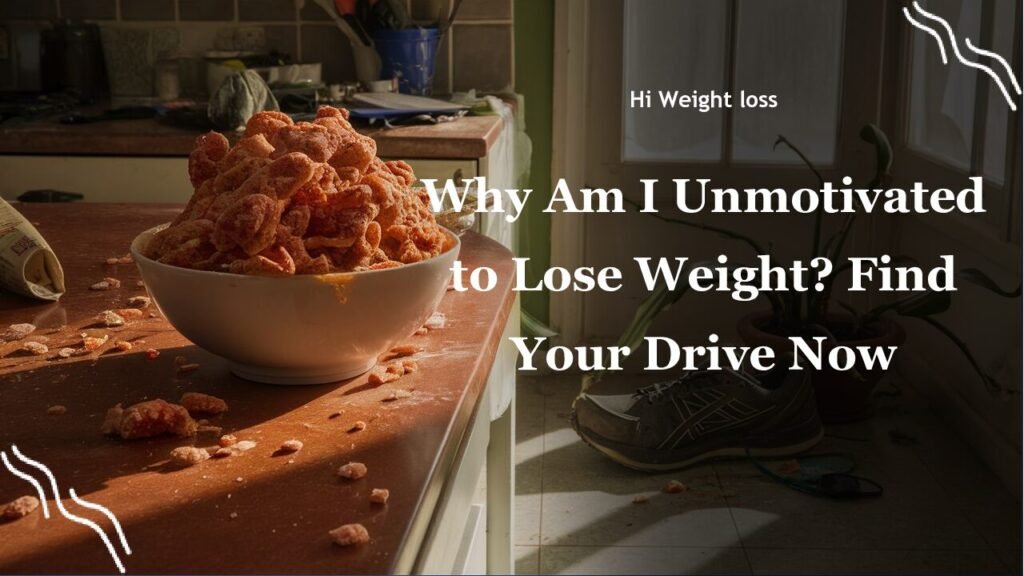“`
Feeling like you’re stuck in quicksand, watching your weight loss goals slip further away? It’s a frustrating place to be, and you’re not alone. Many people struggle with a lack of motivation when trying to lose weight, and that’s perfectly normal. This article will explore the common reasons behind this struggle, delving into psychological and practical hurdles, and then provide you with actionable strategies to rekindle your drive, helping you move toward those goals, not further away.
Why Am I Unmotivated to Lose Weight? Uncovering the Root Causes
Have you ever started a weight loss journey with gusto, only to find your enthusiasm dwindling? It’s a common experience. The journey can feel like climbing a never-ending staircase when that inner spark goes out.
The Impact of Unclear Weight Loss Goals
One of the biggest culprits behind a lack of motivation is having vague goals. Thinking “I want to lose weight” is different than saying, “I want to lose 10 pounds in the next two months by exercising 3 times a week and reducing sugary drinks.” The former offers no specific target, the latter gives your brain something tangible to chase after. I remember when I first started trying to get in shape, my goal was just “to be healthy.” It was so broad it felt impossible, and I constantly felt lost. It wasn’t until I defined clear, measurable targets that I felt I could progress.
According to _research_, having specific objectives significantly improves your motivation to lose weight.
The Frustration of Delayed Results
Weight loss isn’t linear; it ebbs and flows. When you don’t see immediate changes on the scale, it’s easy to get discouraged. My friend Sarah started running every morning, and though she felt healthier, the number on the scale didn’t drop immediately. She nearly gave up because of it. It wasn’t until she started celebrating her increased energy and improved stamina, rather than focusing solely on the numbers, that she started staying motivated. _Small victories_ are key to long-term commitment.
Overwhelming Approaches and Burnout
Have you ever tried to completely overhaul your diet and exercise routine overnight? It’s tempting, but often leads to burnout. Crash diets and excessive exercise are unsustainable. I’ve been there myself; I went all-in on a super restrictive diet and was running twice a day. It lasted maybe two weeks before I was exhausted and ready to quit. A balanced, gradual approach, including a healthy diet, regular exercise, and adequate rest, is more effective in the long run, that is what _experts recommend_.
The Detrimental Impact of Negative Body Image
Body dissatisfaction is sadly common, and research, from _Juniper_, shows that 4 out of 5 women in Australia are unhappy with their bodies. When you don’t like what you see in the mirror, it can be harder to engage in activities that promote weight loss, like exercise. Negative body image can be a self-fulfilling prophecy, perpetuating a cycle of self-doubt and inactivity. Instead of being motivated by self-love, you start from a place of self-hate, which can be very demotivating.
The Role of Stress in Weight Loss Motivation
Stress is a silent saboteur, wreaking havoc on your weight loss journey. When you’re stressed, your body releases cortisol, which can slow down your metabolism, promote overeating, increase blood sugar, and decrease muscle mass. I know during my intense work periods, stress completely derails my healthy eating habits and makes it hard to muster energy for exercise. Stress also disrupts sleep, further imbalancing the hormones that control appetite and energy. It’s a vicious cycle that can make staying motivated an uphill battle.
As noted by _studies_, stress significantly influences your weight maintenance and can hinder your efforts.
The Pitfalls of Emotional Eating
Emotional eating, that is when you seek comfort in food, especially when you’re not hungry, is a widespread issue. A 2015 survey by the Australian Psychological Society found that 75% of Australians use food to cope with stress. When you’re in an emotional state, you often reach for high-energy, sugary, or fatty foods, which can lead to overeating and sabotage your weight loss efforts. I sometimes find myself reaching for a bag of chips when I’m feeling down, even when I’m not physically hungry. This habit can be a real challenge to overcome, making it difficult to stay focused on your goals. _Research_ has shown that emotional eating can greatly affect one’s ability to feel full and may cause overeating.
Intrinsic vs. Extrinsic Motivation
Motivation comes in two flavors: intrinsic and extrinsic. Extrinsic motivation is fuelled by external rewards, like getting likes on social media, while intrinsic motivation comes from the pleasure of the process itself. People who find joy in exercise itself or love the feeling of nourishing their bodies with healthy food, usually have better long-term weight loss outcomes. It’s like the difference between seeing exercise as a chore and a fun challenge; one feels forced, the other feels like a genuine choice. As explained in _this article_, stronger intrinsic motivation leads to better results.

Strategies for Reigniting Your Motivation
Now that you know the common reasons for low motivation, how do you get back on track? Let’s look at some strategies.
Setting Clear and Achievable Goals
Start by setting specific, measurable, achievable, relevant, and time-bound (SMART) goals. Instead of “lose weight,” aim for “lose one pound per week by doing 30 minutes of exercise five times a week.” These goals provide direction, making it easier to track your progress.
Celebrate Small Wins
Don’t wait for the big milestones. Celebrate every step, no matter how small. Did you walk for 20 minutes today? Great! Did you make a healthy meal? Awesome! Acknowledging these small victories will keep you going. Remember Sarah, my friend who found her motivation by celebrating her energy levels instead of focusing on the numbers on the scale?
Finding Sustainable Approaches
Avoid crash diets and extreme exercise plans. Instead, focus on building sustainable habits that you enjoy. Instead of dreading your workouts, maybe try a dance class or find a hiking trail that you actually like. Enjoyment is key to consistency.
Cultivating a Positive Body Image
Focus on the good things your body can do. It’s time to re-frame your view of yourself and focus on what your body *can* do, instead of what it looks like. Instead of just looking at your reflection in the mirror and feeling bad, make an effort to focus on your body’s strength, endurance, and capability. When you start to appreciate how your body feels, your actions will begin to reflect it.
Managing Stress Effectively
Implement stress-reducing techniques such as meditation, yoga, or deep breathing. Find what works best for you. This not only helps your mind and mental well-being, but also positively impacts weight management. Remember that high cortisol levels can lead to weight gain.
Breaking the Cycle of Emotional Eating
If emotional eating is a problem, try keeping a food journal to understand your triggers. You might find you reach for snacks when you’re bored, stressed, or lonely. By identifying these, you can start to find healthier coping strategies, such as going for a walk or talking to a friend.
Harnessing Intrinsic Motivation
Focus on activities you genuinely enjoy. This is where you can shift your perspective from what your body looks like to how it feels. Think about a moment when your body felt good. Find joy in the activity itself, not just the potential weight loss results. You will be more likely to stay motivated if you enjoy the process.
| Reason for Lack of Motivation | Solution |
|---|---|
| Unclear Weight Loss Goals | Set specific, measurable, achievable goals. |
| Lack of Immediate Visible Results | Celebrate small victories, like more energy. |
| Overwhelming Approaches and Burnout | Adopt a balanced, gradual approach. |
| Negative Body Image | Focus on your body’s strengths and capabilities. |
| Stress | Use stress-reduction techniques. |
| Emotional Eating | Identify triggers and find healthy alternatives. |
| Extrinsic Motivation | Focus on enjoying the process for intrinsic motivation. |
Conclusion
The journey to weight loss can be challenging, with motivation levels often fluctuating. As we’ve explored, unclear goals, a focus on immediate results, and unsustainable plans can all derail your efforts. External factors like stress, emotional eating, and a negative body image also play a huge role in your motivation. But with the strategies you’ve read in this article, you can regain control and rekindle your drive. Setting clear goals, celebrating small wins, managing stress, and adopting a positive mindset can make the journey more enjoyable and sustainable. Remember that you’re not alone in your struggles, and with a balanced approach, you can achieve your goals. Just like my own personal experience, where I found my initial aim of just “getting healthier” to be too broad, breaking down the tasks into smaller, more focused and achievable goals is what helped me stay focused. Use these strategies and start your journey today.
Now that you have the knowledge, how will you use it to get started? Share this article with someone who needs it, and begin your journey today!
FAQ
What are some common reasons for lacking motivation in weight loss?
Common reasons include unclear goals, lack of immediate results, overwhelming approaches, negative body image, stress, emotional eating, and relying on extrinsic motivation.
How can I stay motivated for weight loss?
You can stay motivated by setting clear goals, celebrating small wins, choosing sustainable approaches, fostering a positive body image, managing stress, addressing emotional eating, and focusing on intrinsic motivation.
What is the difference between intrinsic and extrinsic motivation?
Extrinsic motivation is driven by external rewards, such as likes on social media, while intrinsic motivation comes from enjoying the process itself. Intrinsic motivation tends to lead to better long-term results.
How does stress affect weight loss?
Stress can increase cortisol levels, slowing metabolism, promoting overeating, and reducing muscle mass. It also disrupts sleep, which impacts appetite hormones.
What are some healthy ways to deal with emotional eating?
Healthy alternatives include keeping a food journal to identify triggers, engaging in physical activity, talking to a friend, or practicing relaxation techniques.
“`



